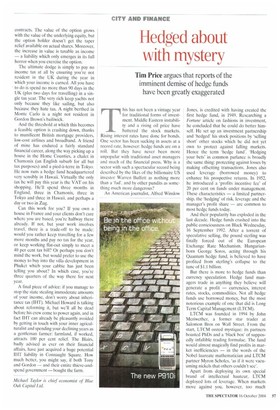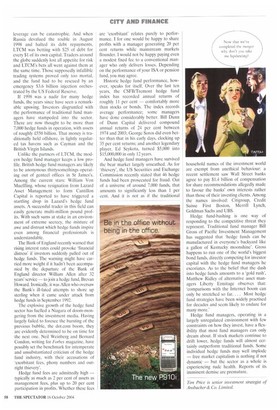Hedged about
with mystery Tim Price argues that reports of the imminent demise of hedge funds have been greatly exaggerated This has not been a vintage year for traditional forms of investment. Middle Eastern instability and a rising oil price have battered the stock markets. Rising interest rates have done for bonds. One sector has been sucking in assets at a record rate, however: hedge funds are on a roll, But they have never been more unpopular with traditional asset managers and much of the financial press. Why is a sector with such a spectacular record being described by the likes of the billionaire US investor Warren Buffett as nothing more than a lad', and by other pundits as something much more dangerous?
An American journalist, Alfred Winslow Jones, is credited with having created the first hedge fund, in 1949. Researching a Fortune article on fashions in investment, he concluded that he could do better himself. He set up an investment partnership and 'hedged' his stock positions by `selling short' other stocks which he did not yet own to protect against falling markets. Hence the term 'hedge fund'. 'Hedging your bets' in common parlance is broadly the same thing: protecting against losses by making offsetting transactions. Jones also used leverage (borrowed money) to enhance his prospective returns. In 1952, he introduced a 'profits incentive fee' of 20 per cent on funds under management. These characteristics — a limited partnership, the 'hedging' of risk, leverage and the manager's profit share — are common to most hedge funds today.
And their popularity has exploded in the last decade. Hedge funds crashed into the public consciousness on Black Wednesday, 16 September 1992. After a torrent of speculative selling, the pound sterling was finally forced out of the European Exchange Rate Mechanism. Hungarianborn George Soros, acting through his Quantum hedge fund, is believed to have profited from sterling's collapse to the tune of $1.1 billion.
But there is more to hedge funds than currency speculation. Hedge fund managers trade in anything they believe will generate a profit — currencies, interest rates, stocks, commodities. Not all hedge funds use borrowed money, hut the most notorious example of one that did is Long Term Capital Management (LTCM).
LTCM was founded in 1994 by John Meriwether, a former star trader at Salomon Bros on Wall Street. From the start, LTCM oozed mystique: its partners boasted PhDs and a 'black box' of supposedly infallible trading formulae. The fund would almost magically find profits in market inefficiencies — in the words of the Nobel laureate mathematician and LTCM partner Myron Scholes, 'as if it were vacuuming nickels that others couldn't see'.
Apart from deploying its own special brand of intellectual hauteur, LTCM deployed lots of leverage. When markets move against you, however, too much leverage can be catastrophic. And when Russia devalued the rouble in August 1998 and halted its debt repayments, LTCM was betting with $25 of debt for every $1 of its own capital. Traders around the globe suddenly lost all appetite for risk and LTCM's bets all went against them at the same time. Those supposedly infallible trading systems proved only too mortal, and the fund had to be rescued by an emergency $3.6 billion injection orchestrated by the US Federal Reserve.
If 1998 was a nadir for many hedge funds, the years since have seen a remarkable upswing. Investors disgruntled with the performance of traditional fund managers have stampeded into the sector. There are now thought to be more than 7,000 hedge funds in operation, with assets of roughly £550 billion. That money is traditionally held offshore, in lightly regulated tax havens such as Cayman and the British Virgin Islands.
Unlike the partners of LTCM, the modern hedge fund manager keeps a low profile. British hedge fund managers are likely to be anonymous thirtysomethings operating out of genteel offices in St James's. Among the current stars: William Von Mueftling, whose resignation from Lazard Asset Management to form Cantillon Capital is reported to have triggered a startling drop in Lazard's hedge fund assets. A successful trader in this field can easily generate multi-million pound profits. With such sums at stake in an environment of extreme secrecy, the mixture of awe and distrust which hedge funds inspire even among financial professionals is understandable.
The Bank of England recently warned that rising interest rates could provoke Tmancial distress' if investors suddenly pulled out of hedge funds. The warning might have carried more weight if it hadn't been accompanied by the departure of the Bank of England director William Allen after 32 years' service — to join a hedge fund, Brevan Howard. Ironically, it was Allen who oversaw the Bank's ill-fated attempts to shore up sterling when it came under attack from hedge funds in September 1992.
The explosive growth of the hedge fund sector has fuelled a Niagara of doom-mongering from the investment media. Having largely failed to foresee the bursting of the previous bubble, the dot.com boom, they are evidently determined to be on time for the next one. Neil Weinberg and Bernard Condon, writing for Forbes magazine, have possibly set the benchmark for intemperate and unsubstantiated criticism of the hedge fund industry, with their accusations of 'exorbitant fees, phony numbers and outright thievery'.
Hedge fund fees are admittedly high — typically as much as 2 per cent of assets as management fees, plus up to 20 per cent participation in profits. Whether these fees are 'exorbitant' relates purely to performance. I for one would be happy to share profits with a manager generating 20 per cent returns while mainstream markets flounder. I would not be happy paying even a modest fixed fee to a conventional manager who only delivers losses. Depending on the performance of your ISA or pension fund, you may agree.
Historic hedge fund performance, however, speaks for itself. Over the last ten years, the CSFB/Tremont hedge fund index has recorded annual returns of roughly 11 per cent — comfortably more than stocks or bonds. The index records average performance; some managers have done considerably better. Bill Dunn of Dunn Capital delivered compound annual returns of 24 per cent between 1974 and 2003; George Soros did even better than that in his early days, clocking up 35 per cent returns; and another legendary player, Ed Seykota, turned $5,000 into $15,000,000 in only 12 years.
And hedge fund managers have survived the bear market largely unscathed. As for 'thievery', the US Securities and Exchange Commission recently stated that 46 hedge funds had been prosecuted for fraud. Out of a universe of around 7,000 funds, that amounts to significantly less than 1 per cent. And it is not as if the traditional household names of the investment world are exempt from unethical behaviour: a recent settlement saw Wall Street banks agree to pay $1.4 billion of compensation for share recommendations allegedly made to favour the banks' own interests rather than those of their investing clients. Among the names involved; Citigroup, Credit Suisse First Boston, Merrill Lynch, Goldman Sachs and UBS.
Hedge fund-bashing is one way of responding to the competitive threat they represent. Traditional fund manager Bill Gross of Pacific Investment Management has suggested that 'hedge funds can be manufactured in everyone's backyard like a gallon of Kentucky moonshine'. Gross happens to run one of the world's biggest bond funds, directly competing for investor capital with the hedge fund managers he excoriates. As to the belief that the dash into hedge funds amounts to a 'gold rush', Matthew Ridley of alternative asset managers Liberty Ermitage observes that: 'comparisons with the Internet boom can only be stretched so far. . .. Most hedge fund strategies have been widely practised for decades and seem likely to endure for many more.'
Hedge fund managers, operating in a largely unregulated environment with few constraints on how they invest, have a flexibility that most fund managers can only dream about. If stock markets continue to drift lower, hedge funds will almost certainly outperform traditional funds. Some individual hedge funds may well implode — free market capitalism is nothing if not dynamic — but the sector as a whole is experiencing rude health. Reports of its imminent demise are premature.
Tim Price is senior investment strategist of Ansbacher & Co. Limited.











































































































 Previous page
Previous page